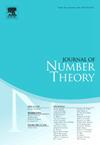解决Erdős的单模性问题
IF 0.7
3区 数学
Q3 MATHEMATICS
引用次数: 0
摘要
设δ1(n,m)为(n,m)中恰好有一个除数的整数集的密度,Erdős想知道δ1(n,m)对于固定n是否单模。我们一般证明这是错误的,因为序列(δ1(n,m))具有超多项式的多个局部极值。然而,我们在它发生的单一情况下确认单峰性;n = 1。我们还解决了第k素数为p的整数密度的单模性问题。本文章由计算机程序翻译,如有差异,请以英文原文为准。
Resolution of Erdős' problems about unimodularity
Letting be the density of the set of integers with exactly one divisor in , Erdős wondered if is unimodular for fixed n. We prove this is false in general, as the sequence has superpolynomially many local extrema. However, we confirm unimodality in the single case for which it occurs; . We also solve the question on unimodality of the density of integers whose prime is p.
求助全文
通过发布文献求助,成功后即可免费获取论文全文。
去求助
来源期刊

Journal of Number Theory
数学-数学
CiteScore
1.30
自引率
14.30%
发文量
122
审稿时长
16 weeks
期刊介绍:
The Journal of Number Theory (JNT) features selected research articles that represent the broad spectrum of interest in contemporary number theory and allied areas. A valuable resource for mathematicians, the journal provides an international forum for the publication of original research in this field.
The Journal of Number Theory is encouraging submissions of quality, long articles where most or all of the technical details are included. The journal now considers and welcomes also papers in Computational Number Theory.
Starting in May 2019, JNT will have a new format with 3 sections:
JNT Prime targets (possibly very long with complete proofs) high impact papers. Articles published in this section will be granted 1 year promotional open access.
JNT General Section is for shorter papers. We particularly encourage submission from junior researchers. Every attempt will be made to expedite the review process for such submissions.
Computational JNT . This section aims to provide a forum to disseminate contributions which make significant use of computer calculations to derive novel number theoretic results. There will be an online repository where supplementary codes and data can be stored.
 求助内容:
求助内容: 应助结果提醒方式:
应助结果提醒方式:


